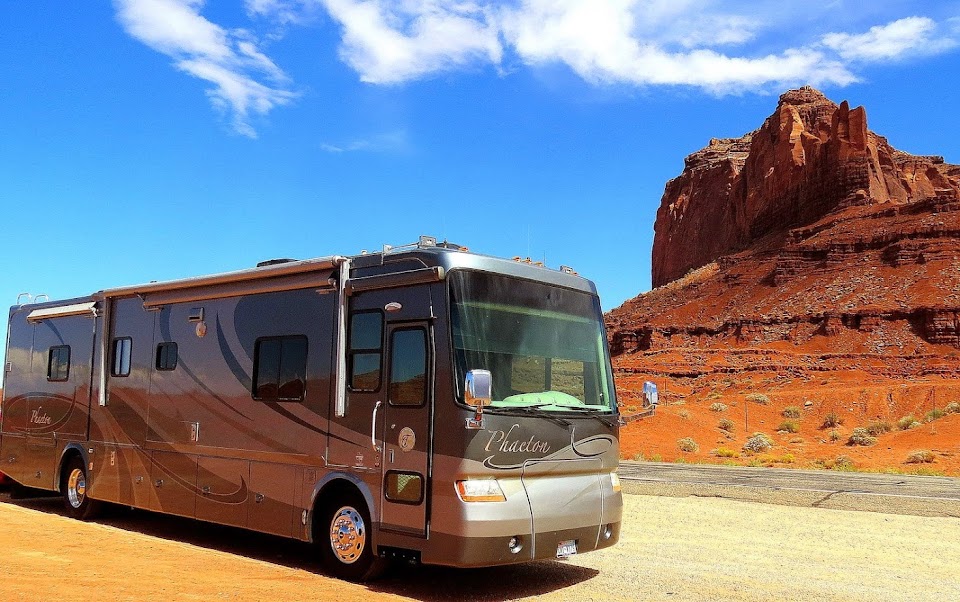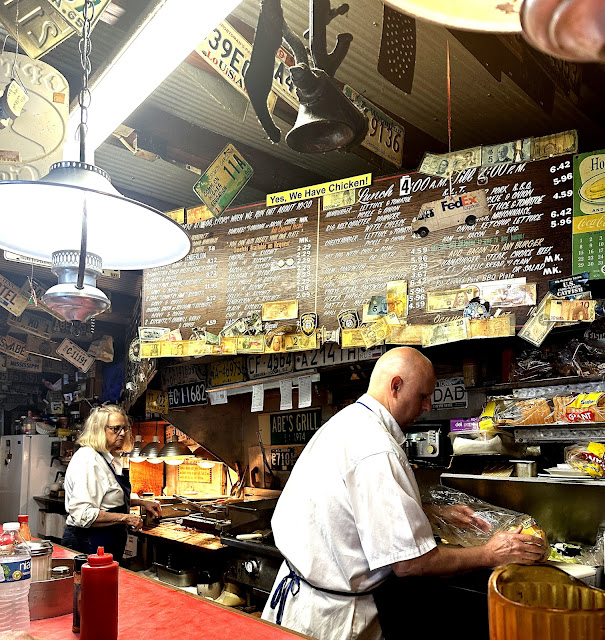At Tom Sawyer RV Park, West Memphis, Arkansas...
You may recall from a previous post that I had made a miscalculation about the need to make an appointment at Bay Diesel for Phannie's annual checkup. We spent quite a few, um, less-than-productive days awaiting our turn, and then the day came. The servicing took only a couple of hours, but we learned from the tech that some more work would be needed, and that would involve the ordering of parts.
Ordering parts for a "classic" coach like Phannie is not always easy, and it certainly doesn't happen quickly. It seems the old girl needs attention mostly to the suspension system, something that is completely understandable after 16 years and 125,000 miles. The need, it appears, is for new airbags, repair to a leak in the air line, new shocks and, oh, by the way, new engine hoses. The old gal is still quite drivable, and I don't notice any difference in her handling, but I really had some misgivings about a long trip to Colorado this summer without updating things that could cause a breakdown in the middle of nowhere.
So, I had quite a bit of back-and-forth with Teresa at Bay Diesel regarding when Phannie may return to have all this done. "Well," she said, "We're gonna have to order some parts, and we don't know how long it will take to get them here for a coach like yours."
I thought her choice of words was nicely done--typical of ladies of the South. If we had been somewhere in Yankee territory, I would probably have heard something like, "It's gonna take us a while to comb through junkyards to find what you need for this derelict coach of yours."
Well, some may think she is a derelict, but she has been lovingly cared for and has had many new upgrades over the years. Her hulky Caterpillar diesel engine, the same monster that runs hundreds of thousands of pieces of construction equipment all over the world, has never had a hiccup, and it has not needed a drop of DEF. Studies have shown that it should easily reach 500,000 miles before any major repair is needed; that will certainly outlast us! Phannie is solidly built from when almost every Tiffin owner will admit were the "good" years. Trade her off? Unthinkable.
Teresa and I settled on July 24 as the day of the work. "July 24?" I was aghast that we would have to hang around for a month in a town that was too small even for a WalMart. Red Bay doesn't even have a Dairy Queen, for goodness' sake!
During our downtime awaiting her service visit, I had Phannie's exterior lighting upgraded to something a little brighter when we need it. I'm pretty happy with the result:
Since we had more than a month to kill before July 24, we decided to drive over to Memphis and attend the annual gospel quartet show. Having been a gospel pianist all my life, I really enjoy these. We always park at the Tom Sawyer campground by the Mississippi River. It's always fun to watch the river traffic go by:
The river is very low right now, as you can tell from the narrowness at this point. This places the navigable channel very close to our campground, which is even better for viewing the river traffic.
Walking near the water, I spotted these old logs that had been washed downriver perhaps decades ago, undoubtedly uprooted by a flood from who-knows-where:
There is so much history associated with this mighty river, it is easy to get lost in thought about its past and, indeed, its present. I could almost hear the wonderful old song, "Old Man River" that I play often when I do show tunes on the piano:
After attending the quartet show, we'll leave Memphis and spend a couple of weeks in Branson with old friends Larry and Carolyn and their family. That will be a fun experience and a pleasant way to pass the time until our return to Red Bay.
After that, we will finally make our way to Colorado and the cool mountain air. Fortunately, the temperature has been unusually comfortable in this area since we left Texas. I hope it stays that way for another month. I looked at the temperature in Hondo today, and it was 104 with a heat index of 117; that's why most of the park empties out in the summertime. We think of our friends who have to stay there in the summer and thank Mr. Carrier for inventing air conditioning.
Thanks to all for hanging on as we take the curves in our trip plans, but that's the nice thing about being retired--who cares?













